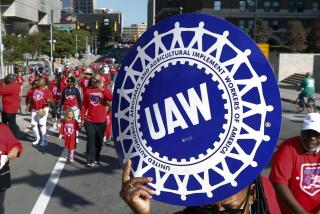Strike in Brazil Testing Labor, Auto Producers
RIO DE JANEIRO — The eight-week strike at the Ford and Volkswagen plants near Sao Paulo has developed into a major test of strength between the 200,000-member metalworkers’ union and the foreign-owned companies that have made Brazil the largest producer of autos in Latin America.
It has also frustrated the new civilian government’s effort to reduce the labor tension that has plagued its first two months in office.
An apparent breakthrough was reported Friday night in the Volkswagen strike when management agreed to pay severance to workers dismissed during the strike. But union leaders said work could still be halted intermittently until the companies agree to resume negotiations on a new contract.
Earlier, Jacy Mendonca, a Volkswagen director and a member of the management negotiating team, had said, “We can’t give in now without risking a succession of future strikes.”
Union-Busting Charged
Jair Meneguelli, president of the metalworkers’ union of Sao Bernardo do Campo and Diadema, the industrial suburbs of Sao Paulo where some of the major factories are located, said, “The multinational auto companies are clearly trying to break the union, and we can’t accept that without undermining organized labor in Brazil.”
The strike is the longest in the history of Brazil’s auto industry, which last year exported more than $2-billion worth of cars, trucks and parts.
In other labor conflicts, government-sponsored negotiations have brought about agreement on new contracts. One settlement ended strikes by more than 100,000 cane cutters and orange pickers in the state of Sao Paulo, where the harvest began this month.
In the rural strikes, as in recent strikes by Sao Paulo’s postal workers and school teachers, unions settled for much less than they had originally demanded. The gains have been little more than wage corrections for inflation, which has raised prices 225% in the past year.
Cabinet Divisions Told
The strikes have been a major test for the government of President Jose Sarney, who took office March 15. Differences on how to deal with the disputes have led to political divisions in the Cabinet.
Roberto Gusmao, the minister of industry and commerce, has endorsed a business-backed movement asking that the government declare the strikes illegal and prosecute the leaders. But Labor Minister Almir Pazzianotro has refused to declare the strikes illegal and has sought to mediate, in some cases successfully.
In the auto industry dispute, the metalworkers’ union was able to obtain agreement on a new contract with the Association of Auto Parts Makers, most members of which are wholly Brazilian firms. They employ about 70,000 workers.
As the weeks of the strike wore on and the companies began dismissing workers, some strikers returned to their jobs. Some companies, including General Motors and Mercedes Benz, restored production pending an agreement.
Heavy Export Cost
But the strike has continued at Ford and Volkswagen, which together have more than 33,000 workers and are the two biggest producers. According to industry sources, the loss of production is costing Brazil heavily in export earnings, which are reportedly down by $200 million.
The key issue in the auto plants has been a reduction of the work week, to 44 hours in 1987 from 48 hours. Management of the foreign-owned plants insists that it can make no such concession so long as the government controls the price of vehicles. The companies have agreed to a 5% wage increase.
The workers argue that their pay is no more than a fifth of what American auto workers are paid for similar work.
More to Read
Sign up for Essential California
The most important California stories and recommendations in your inbox every morning.
You may occasionally receive promotional content from the Los Angeles Times.










